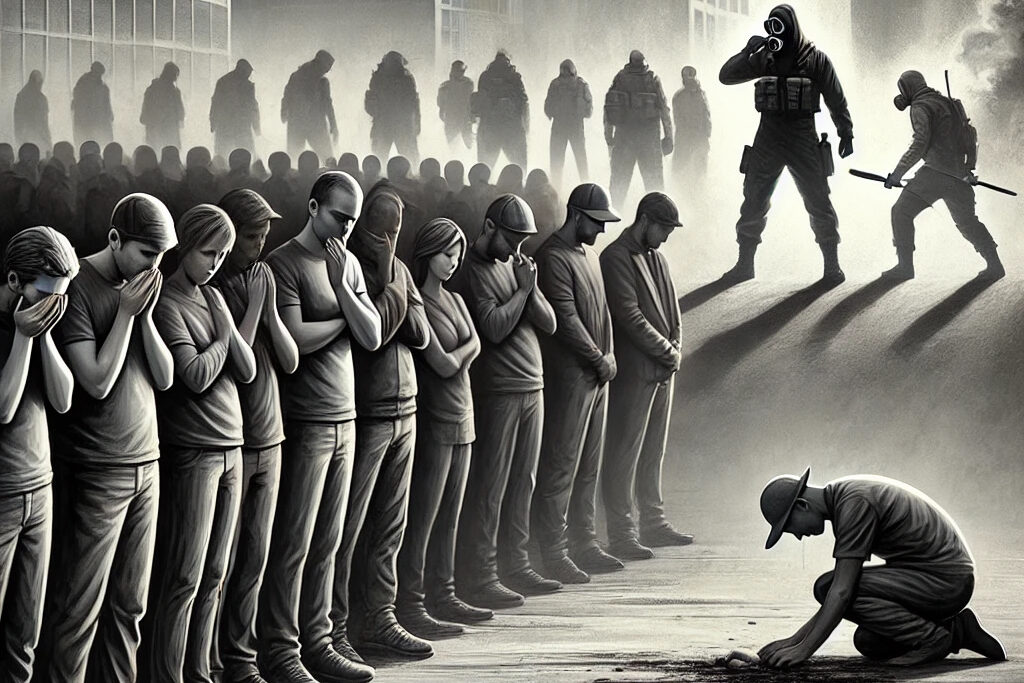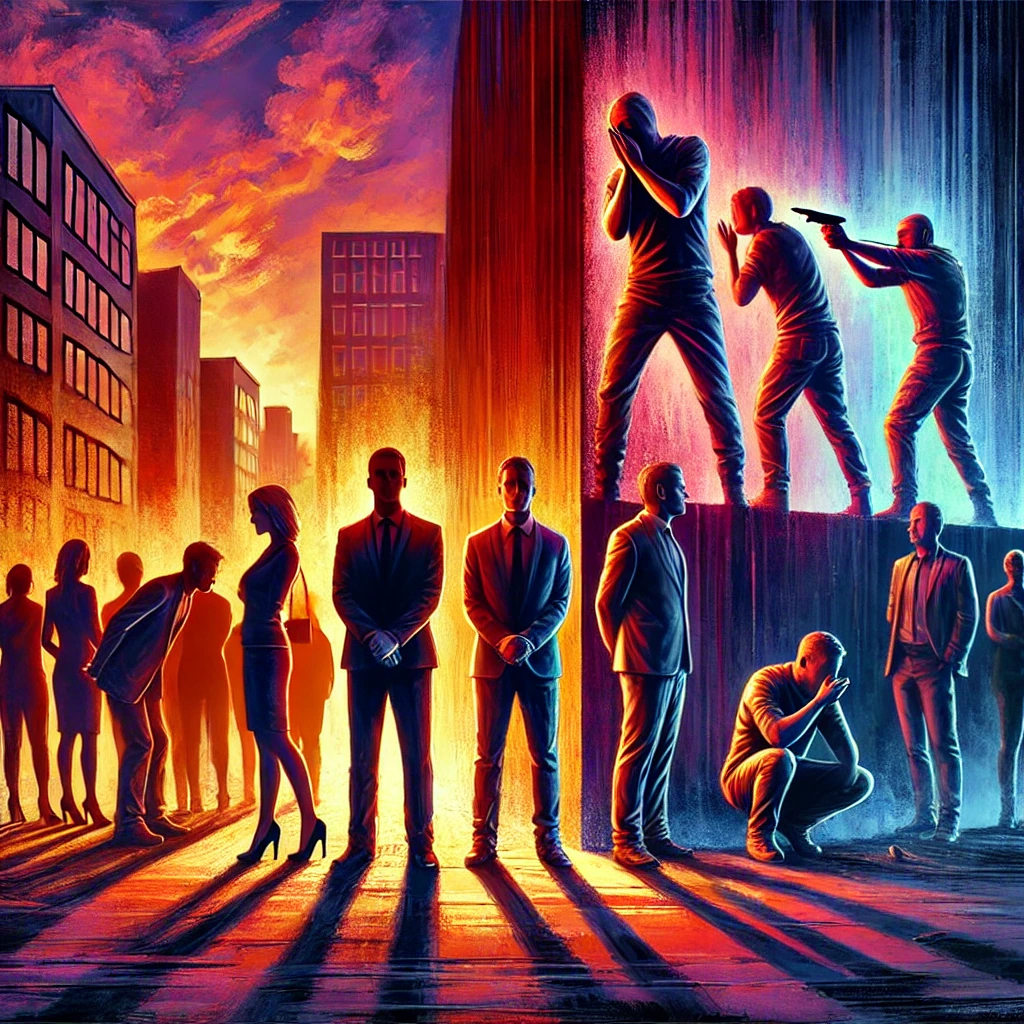“做一个好人”——这是几乎每个人尤其是新中华社会从小被灌输的道德准则,家长教导孩子,学校教育学生,社会舆论也不断强调“好人”应当如何行事。然而,真正让社会变得更美好的,并不是“好人”本身,而是有逻辑思考、有行动能力、敢于面对不公的人。在现实生活中,许多“好人”在面对极端势力、集体暴力、不公正压迫时往往选择沉默、顺从、甚至间接支持。他们不一定是坏人,但他们的沉默,造就了最坏的结果。
这样的“好人”实际上就是人们心里所说的懦夫,“好人”恰恰是这些人的借口和皇帝的新装。历史上,中国与世界范围内的无数惨剧,都不是因为“坏人”太多,而是因为“好人”太软弱、太麻木、太顺从、太会伪装。当社会“沉默的好人”越来越多的时候,坏人就可以肆无忌惮地作恶。
一、“好人”概念是懦夫的伪装
许多人自认为是“好人”,并教育孩子要做“好人”,但问题在于:“好人”这个标签是空的,没有具体的标准,仅仅意味着“不做坏事”;道德被扭曲成服从和顺从,而不是理性和勇气。要知道,好人的定义是被统治阶级或社会群体所塑造的,很多人只是被动地适应环境,而不是主动选择善良。
标榜自己是好人,实际上是避免责任。“我没做坏事,所以我是好人”,但这并不代表他们在面对不公正时采取行动;还有就是,道德感被集体思维绑架。很多人相信自己是“正义的”,但实际上他们只是服从于某种主流舆论,而不是独立思考;专制社会体系鼓励顺从,而不是鼓励真正的善良。那些真正反抗不公正、挑战权力的人,往往被社会边缘化,甚至被指责为“不和谐”或“麻烦制造者”。
二、“沉默的好人”是如何助长恶行的?
历史与现实告诉我们:大规模的社会暴行,几乎都依赖于“沉默的好人”无声的支持和占队。虽然他们并未直接作恶,但他们的漠视、服从、甚至盲目跟随,让真正的恶行得以发生。
(1)那场领袖革命:当“好人”变成帮凶
如果新中国历史上真的充满“好人”,如果我的父辈、祖辈真是“好人”,如果你的父辈、祖辈真是“好人”,那场劫难会发生吗?1966-1976年,红卫兵和造反派大肆批斗、迫害无数“黑五类”分子、知识分子,许多受害者被批斗至死,甚至家破人亡;参与这些暴行的,并不仅仅是那些被鼓动的“好人”,还有千千万万个自认“正义”的“好人”。他们揭发亲人、同事、朋友,只因为“组织要求;他们在批斗会上高喊口号,并不觉得自己在犯罪;他们“只是服从命令”,但这些命令,正在摧毁无数家庭。如果当时有更多真正有思考能力和勇气的人站出来,这场疯狂的浩劫或许不会如此极端。
(2)三年大饥荒:当“好人”装作看不见
1959-1961年,数千万人在饥饿中死去。并不是没有人知道全国正在闹饥荒,地方官员、干部、知情者都知道现实是怎样的;但他们没有人敢说真话,因为害怕被定性为“反革命”;于是,中央收到的报告里,仍然是粮食丰收、人民幸福的谎言,而普通百姓只能在沉默中活活饿死。如果当时有更多人勇敢揭露真相,更多人能逃离虚假的政治气氛,那么历史可能会不同。
(3)新冠疫情封控:当“好人”选择服从
2020-2022年,中国的极端封控政策,曾使无数人陷入困境。许多病人无法就医而死,许多老人被困家中无人照料;然而,面对极端防疫措施,大多数人选择沉默,甚至主动举报违反封控规定的人;当封控升级时,他们说:“国家是在保护我们”;当封控突然放开时,他们又说:“国家是在为人民考虑”。真正推动政策松动的,不是那些“服从的好人”,而是那些敢于发声、敢于质疑的人。
如果说你、我的父辈、祖辈没有文化,没刷过抖音、没上过互联网不了解社会,我们这一代了解这个社会吗?不照样还是一个懦夫?所以在提高认知这件事上,知识和学历、住平房、高层还是别墅、甚至物价水平等等,统统没有关系。

(4)伊斯兰极端主义:当温和穆斯林沉默
世界上绝大多数穆斯林是和平的普通人,但当少数极端分子作恶时,这些温和的穆斯林大多数选择了沉默:
9/11恐怖袭击(2001):19名极端分子劫持飞机袭击美国,但全世界十几亿穆斯林中,有多少人公开谴责?许多穆斯林国家的政府选择避谈、推卸责任,而不是主动剿灭极端主义。
ISIS崛起(2014):当ISIS在伊拉克和叙利亚屠杀异教徒、贩卖女性、焚毁文化遗产时,许多伊斯兰国家政府和宗教领袖都选择沉默。如果全世界的穆斯林群体更积极地反对ISIS,他们还能存在这么久吗?
法国查理周刊袭击案(2015):讽刺漫画导致伊斯兰极端分子枪杀记者,而许多穆斯林没有谴责枪手,反而指责媒体“冒犯伊斯兰”。真正让伊斯兰极端主义蔓延的,不是所有穆斯林的暴力,而是“心清手洁”、温和穆斯林的沉默。
(5)国际案例:当好人成为独裁者的帮手
纳粹德国(1933-1945):希特勒的政权并不是靠少数恶人建立的,而是靠千百万普通德国人的服从、沉默和盲从。犹太人大屠杀时,大多数德国人知道发生了什么,但他们选择装作看不见。
卢旺达大屠杀(1994):胡图族对图西族的大屠杀,导致100万人死亡,但真正持刀杀人的只是少数人,绝大多数人或是在旁观,或是在恐惧中顺从,甚至被煽动后参与了屠杀。

三、圣经:真正的“好人”应该如何?
圣经从未教导信徒只是做个“好人”,而是要“行公义,好怜悯”。
“世人哪,耶和华已指示你何为善,他向你所要的是什么呢?只要你行公义,好怜悯,存谦卑的心,与你的 神同行。”(弥迦书 6:8)。
(1)耶稣教导人们要直面不公
耶稣敢于挑战权贵,即使知道自己会被杀害;他在圣殿中赶走贪婪的商人(马太福音 21:12-13),表明真正的好人,不是沉默的,而是行动的。
(2)圣经批判那些“自诩为善”的人
法利赛人自认为是“好人”,但耶稣称他们为“假冒伪善”,道德表面化,而没有行动的信仰,是虚伪的。
“你们这假冒为善的文士和法利赛人有祸了!因为你们好像粉饰的坟墓,外面好看,里面却装满了死人的骨头和一切的污秽。(马太福音 23:27 和合本)
四、 这个社会真正需要什么?
(1)有逻辑思考的人,而不是伪善的“好人”
社会需要的不是一群自我感觉良好的“道德标兵”,而是能独立思考、对现实有清晰认知、能采取行动的人。理性分析现实,而不是盲目相信官方宣传或大众情绪;做出合理选择,而不是随波逐流,选择沉默或跟风迫害别人;面对不公正时,至少不助纣为虐,更进一步,则是尽可能制止恶行。
(2)社会更需要三种人
能让自己幸福且不依赖压迫他人的人。这种人知道如何在社会运作中找到自己的位置,既不过度牺牲,也不害人;他们关注自己的理想和价值,而不是盲目地迎合“好人”标准。
能够帮助他人实现理想的人。他们不只是“善良”,而是有能力、有智慧,能够帮助更多人走向更好的生活。
能够制止恶行的人。这些人才是真正值得尊敬的人,哪怕他们不被多数人理解,甚至被误解为“麻烦制造者”或“叛逆者”;他们可能无法拯救世界,但至少能让自己不成为帮凶。
五、全家都不要做“沉默的好人”
停止用“好人”定义自己。你是不是个好人不重要,重要的是你能否在现实世界里做出正确的决定。道德不是一种标签,而是一种能力,需要思考和行动。我们的社会、家庭、孩子不需要“好人”,他们需要真正有思考和行动力的人,而且应当警惕,当某个政府不去解决实际的民生问题,却不断宣传“好人精神”时,要问:他们自己是不是那个最大的问题?他们是不是在掩盖自己的不作为?
其实我还是个“好人”,因为有软肋,也怕吃不上饭。
How Many “Good People” Are There in This Family?
“Be a good person”—this is the moral guideline instilled in almost everyone from childhood in the new Chinese society. Parents teach their children, schools educate students, and public discourse repeatedly emphasizes how a “good person” should behave. However, what truly makes society better is not simply the “good people” themselves, but those who think logically, have the ability to act, and dare to confront injustice. In reality, many “good people” choose silence, obedience, or even indirect support when faced with extreme forces, collective violence, or unjust oppression. They may not necessarily be bad people, but their silence produces the worst outcomes.
Such “good people” are, in truth, what people refer to as cowards— “good people” become nothing more than an excuse and the emperor’s new clothes. History—both in China and around the world—shows that the tragedies were not caused by an excess of bad people, but by “good people” who were too weak, numb, obedient, and adept at pretending. As the number of “silent good people” increases in society, the wicked are allowed to act with impunity.
1. The Concept of “Good People” Is a Disguise for Cowardice
Many people consider themselves “good” and teach their children to be “good,” but the problem is that the label “good person” is empty—it lacks a concrete standard and simply means “not doing bad things.” Morality has been twisted into a matter of obedience and compliance, rather than rationality and courage. One must understand that the definition of a good person is shaped by the ruling class or dominant social groups; many people passively adapt to their environment instead of actively choosing kindness.
Boasting of oneself as a good person is essentially a way to avoid responsibility. “I haven’t done anything bad, so I must be a good person” is a claim that does not imply one will take action when faced with injustice. In addition, moral sensibility has been hijacked by collective thinking. Many believe themselves to be “righteous,” yet in reality they are merely obeying a mainstream consensus rather than engaging in independent thought. Authoritarian systems encourage obedience rather than genuine goodness. Those who truly stand up against injustice and challenge authority are often marginalized by society or even labeled as “unharmonious” or “troublemakers.”
2. How Do “Silent Good People” Help Enable Evil?
Both history and reality show that large-scale social atrocities almost invariably depend on the silent support and passive acquiescence of “silent good people.” Although they do not commit the evil acts directly, their indifference, obedience, or blind following allow true evils to occur.
(1) That Revolutionary Period: When “Good People” Become Accomplices
If the history of the new China were truly filled with “good people,” if my parents and grandparents were truly “good people,” if your parents and grandparents were truly “good people,” would that catastrophe have occurred? From 1966 to 1976, the Red Guards and rebel factions conducted widespread struggle sessions and persecuted countless “black class” elements and intellectuals; many victims were publicly humiliated to death or had their families destroyed. Those who participated in these atrocities were not only the incited “good people” but also countless self-proclaimed “righteous” good people. They denounced their relatives, colleagues, and friends simply because “the organization required it”; they chanted slogans at struggle sessions without realizing they were committing crimes; they claimed to have “just followed orders,” yet these orders were destroying countless families. Had more people with true thinking ability and courage spoken out at that time, perhaps this lunacy would not have escalated so extremely.
(2) The Three Years of Famine: When “Good People” Pretend Not to See
Between 1959 and 1961, tens of millions perished in a famine. It was not that no one knew the country was suffering from starvation—local officials, cadres, and those in the know all understood the grim reality—but no one dared to speak the truth for fear of being labeled “counter-revolutionary.” Consequently, the reports reaching the central authorities still boasted bountiful harvests and a happy people, while ordinary citizens starved to death in silence. Had more people had the courage to expose the truth and had more people been able to escape the false political atmosphere, history might have been different.
(3) COVID-19 Lockdowns: When “Good People” Choose to Obey
From 2020 to 2022, China’s extreme lockdown policies trapped countless people in hardship. Many patients died without medical help, and numerous elderly people were left confined at home without care. Yet, in response to the extreme epidemic prevention measures, the majority chose silence—even proactively reporting those who violated lockdown rules. When the lockdown intensified, they said, “The state is protecting us”; when the lockdown was suddenly lifted, they said, “The state is considering the people.” It was not the “obedient good people” who ultimately pushed for policy relaxation, but those who had the courage to speak out and question the measures.
If your parents and my parents, and our grandparents were uneducated, had never used Douyin or the internet and remained unaware of society, would our generation truly understand this society? Wouldn’t we still be cowards? Therefore, when it comes to improving one’s understanding, factors like knowledge, educational background, whether one lives in a modest home or a villa, even the level of prices, are all irrelevant.

(4) Islamic Extremism: When Moderate Muslims Remain Silent
The vast majority of Muslims in the world are peaceful ordinary people, but when a few extremists commit atrocities, most moderate Muslims choose silence:
– 9/11 Terrorist Attacks (2001): Nineteen extremists hijacked airplanes and attacked the United States; yet among the billions of Muslims worldwide, how many openly condemned the attack? Many governments of Muslim-majority countries chose to avoid the subject and shirk responsibility rather than actively eradicate extremism.
– The Rise of ISIS (2014): When ISIS massacred infidels, trafficked women, and burned cultural relics in Iraq and Syria, many government and religious leaders in Muslim countries remained silent. Had the global Muslim community been more proactive in opposing ISIS, such extremist groups might not have lasted as long.
– The Charlie Hebdo Attack in France (2015): Satirical cartoons led to extremists shooting journalists; yet many Muslims did not condemn the gunmen, instead accusing the media of “offending Islam.” The real enabler of Islamic extremism is not the violent acts of all Muslims, but rather the silence of those “pure in heart and clean in hands,” the moderate Muslims.
(5) International Cases: When Good People Become Aids to Dictators
– Nazi Germany (1933–1945): Hitler’s regime was not established solely by a few evil people but was built on the obedience, silence, and blind conformity of millions of ordinary Germans. During the Holocaust, most Germans knew what was happening, but chose to pretend not to see.
– The Rwandan Genocide (1994): The mass slaughter of Tutsis by the Hutu resulted in the deaths of one million people. However, the actual wielders of the knife were only a few; the vast majority either stood by as bystanders, obedient in fear, or were incited later to participate in the massacre.
3. The Bible: What Should a True “Good Person” Be?
The Bible never teaches believers merely to be “good people” but to “act justly and love mercy.” “Humanity, the LORD has shown you what is good; and what does the LORD require of you but to act justly, to love mercy, and to walk humbly with your God?” (Micah 6:8)
(1) Jesus Taught People to Confront Injustice
Jesus dared to challenge the powerful even though He knew He would be killed; for example, He drove the greedy merchants out of the temple (Matthew 21:12–13), demonstrating that a truly good person is not one who remains silent but one who takes action.
(2) The Bible Criticizes Those Who “Claim to Be Good”
The Pharisees considered themselves “good people,” but Jesus called them “hypocrites,” emphasizing that a mere show of piety without righteous action is false. “Woe to you, scribes and Pharisees, hypocrites! For you are like whitewashed tombs, which outwardly appear beautiful, but within are full of dead men’s bones and all uncleanness.” (Matthew 23:27, Chinese Union Version)
4. What Does This Society Truly Need?
(1) People Who Think Logically, Not Hypocritical “Good People”
Society does not need a group of self-satisfied “moral models” but rather individuals who think independently, have a clear understanding of reality, and can act accordingly. They should analyze the situation rationally rather than blindly believing official propaganda or public sentiment; make sensible choices instead of following the crowd, choosing silence, or joining in the persecution of others. When facing injustice, at the very least, they should not aid the wrongdoers—and ideally, they would actively work to stop the evil.
(2) Society Needs Three Types of People
- Those Who Can Make Themselves Happy Without Oppressing Others:
These individuals know how to find their place in society without excessive self-sacrifice or causing harm; they focus on their own ideals and values rather than blindly conforming to the “good person” standard.
- Those Who Can Help Others Achieve Their Ideals:
They are not merely “kind” but are capable, wise, and able to guide more people toward a better life.
- Those Who Can Stop Evil Acts:
These people are truly worthy of respect—even if misunderstood by the majority or branded as “troublemakers” or “rebels.” They may not be able to save the world, but at the very least, they ensure that they do not become accomplices.
5. The Whole Family Must Stop Being “Silent Good People”
Stop defining yourself solely by the label of a “good person.” It does not matter whether you are a good person; what matters is whether you can make the right decisions in the real world. Morality is not a label but a capability—one that requires thought and action. Our society, families, and children do not need “good people” but rather individuals who truly think and act. Moreover, be cautious: when any government avoids addressing real livelihood issues yet incessantly praises the “spirit of good people,” one must ask—are they themselves the biggest problem? Are they covering up their own inaction?
In truth, I am still a “good person” because I have vulnerabilities and fear ending up without food.

发表回复